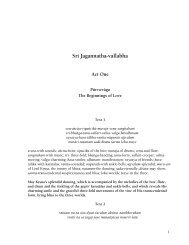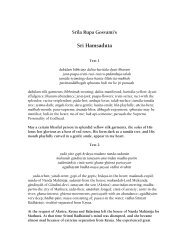Srimad Bhagavatam, Volume 3
Srimad Bhagavatam, Volume 3
Srimad Bhagavatam, Volume 3
Create successful ePaper yourself
Turn your PDF publications into a flip-book with our unique Google optimized e-Paper software.
disturbance in life. One cannot give up the way of comfortable family life due<br />
to affectionate relation with wife and children. Self-realisation is obstructed<br />
by such undue affection of family life and if any one is at all able to forget<br />
such relation some how or other, he is called the undisturbed or Dheera. This<br />
is however a path of renounced order of life based on the sentiment of<br />
frustrated life but stabilisation of such renouncement is possible only by<br />
association of bonafide saint and self-realised souls and thus be engaged in the<br />
loving devotional service of the Lord. Sincere surrender unto the lotus feet<br />
ofthe Lord is possible by awakening of transcendental sense of service made<br />
possible by association of pure devotees of the Lord. Dhritarastra was lucky<br />
enough to have a brother whose very association was a source of liberation for<br />
his frustrated life.<br />
Yah swakat parato ba iha jata nirveda atmavan<br />
Hridi kritwaharim gehat prabrajet sa narotamah.<br />
Yah--any one who, Swakat--by his own awakening, Parato--or by hearing<br />
from other, Jata--becomes, Nirveda--indifferent to material attachment,<br />
Atmavan--consciencious, Hridi--within the heart, Kritwa--having taken by,<br />
Harim--the Personality of Godhead, Gehat--from home, Prabrajet--do go<br />
away, Sa--he is, Narotamah--the first class human being.<br />
A person who understands by awakening of conscience in the matter of<br />
falsity and miserableness of this material world, either by awakening of<br />
his ownself or by hearing from other and thus goes away from home<br />
depending fully on the Personality of Godhead residing within one's<br />
heart,—is certainly the first class human being.<br />
So there are three classes of transcendentalists namely. 1. The Dheera or the<br />
one who is not disturbed being away from the family association, 2. The<br />
renounced order of life orSannyasi by frustrational sentiment and 3. A sincere<br />
devotee of the Lord who awakens God-consciousness by hearing and chanting<br />
and thus leaves home depending completely on the Personality of Godhead<br />
who resides in his heart. The idea is that renouncend order of life after a<br />
frustrational life of sentiment of the material world may be the stepping stone<br />
on the path of self-realistion; but real perfection of such path of liberation is<br />
attained when one is practised to depend fully on the Supreme Personality of<br />
Godhead, Who lives in every one's heart as Paramatama. One may live in the<br />
darkest jungle alone out of home but a steadfast devotee knows very well that<br />
he is not alone. The Supreme Personality of Godhead is with him and He can<br />
protect His sincere devotee from any awkward circumstances out of home.<br />
One should therefore practise the devotional service at home hearing and<br />
chanting of the holy Name, Quality, Form, Pastimes, Entourage etc by<br />
association of pure devotees and this practice will help him awakening of<br />
God-consciousness porportionately of one's sincerity of purpose. One who<br />
desires material benefit by such devotional activities can never depend on the<br />
Supreme Personality of Godhead although He sits in every one's heart.<br />
Neither the Lord gives any direction to such persons who worship Him for<br />
material gain. Such materialistic devotee may be blessed by the Lord with<br />
material benefits but such devotee cannot reach to the stage of the first class<br />
human-being as above mentioned. There are many examples of such sincere<br />
devotees in the history of the world, especially in India, and they are our<br />
guides on the path of self-realisation. Mahatama Vidura is one of such great<br />
devotees of the Lord and we may all try to follow his lotus foot-prints in the<br />
matter of selfrealisation.<br />
Atha udichin disham yatu swair ahnata gatir bhavan<br />
Ito' arbak prayasah kalah pumsam gunavikarsanah.<br />
Please therefore, go away immediately towards the northern side without<br />
any knowledge of your relatives because just in the near future after this<br />
the time is approaching which will diminish man's good qualities.<br />
A life of frustraion can be compensated by becoming a Dheera or leaving<br />
home for good without any knowledge of the relatives and Vidura advised his<br />
eldest brother to adopt the way without delay. Because very quickly the age of<br />
Kali was approaching was also indicated by him. A conditioned soul is<br />
already embarassed by the material association and still in the Kali Yuga good<br />
qualities of a man will deteriorate to the lowest standard. He was advised to<br />
leave home before the time of Kali Yuga approaches, because the atmosphere<br />
which was created by Vidura in response to his valuable instructions on the<br />
fact of life, may fade away due to the influence of the particular age fast<br />
approaching. To become Narottam or the first class human being depending<br />
completely on the Supreme Personality of Godhead, is not possible for any<br />
ordinary man as it is stated in the Bhagwat Geeta (Bg. 7.28) that a person who<br />
is completely relieved of all tints of sinful acts, can alone depend on the<br />
Supreme Lord Sri Krishna the Personality of Godhead. Dhritarastra was<br />
advised by Vidura at least to become a Dheera in the beginning if it was<br />
impossible for him to become a Sannyasi or a Narottam. Persistently<br />
endeavouring on the line of self realisation helps a person to rise up to the<br />
conditions of a Narottam from the stage of Dheera. Dheera stage is attained<br />
after prolonged practice of the Yoga system but by the Grace of Vidura one<br />
can attain the stage immediately simply by willing to adopt the means of<br />
7<br />
Thirteenth Chapter - Dhritarastra Quits Home<br />
Dheera stage which is the preparatory stage for Sannyas and Sannyas stage is<br />
the preparatory stage of Paramhansa or the first grade devotee of the Lord.<br />
Evam raja Vidurenanujena<br />
Prajna chakshur bodhita ajamidhah<br />
Chhitwa swesu snehapasan dadhimna<br />
Nischakrama bhatri samdarshita adhwa.<br />
Evam—thus, Raja—the king Dhritarastra, Vidurenujena—by his Young<br />
brother Vidura, Prajna—introspective knowledge, Chakshur—eyes,<br />
Bodhita—being understood, Ajamidha—Dhritarastra scion of the family of<br />
Ajmidha, Chhitwah—by breaking, Swesv—in the matter of kinsmen,<br />
Snehapasan—strong network of affection, Dradhimna—on account of<br />
steadfastness, Nischakrama—got out, Bhratri—brother, Samdarshita—<br />
direction to, Adhva—the path of liberation.<br />
Thus Maharaj Dhritarastra, the scion of the family of Ajmidha, being<br />
firmly convinced by introspective knowledge, broke up at once the strong<br />
network of family affection on account of resolute determination and<br />
therefore at once he got out of home for going over the path of liberation<br />
as directed by his younger brother Vidura.<br />
Lord Sri Chaitanya Mahaprabhu the great preacher of the principles of <strong>Srimad</strong><br />
Bhagwatam has stressed on the association of Sadhus or pure devotee of the<br />
Lord. He said' even by a moment's association of a pure devote one can<br />
achieve all perfection'. We are not ashamed to admit this fact as experienced<br />
in our practical life. Were we not favoured by His Divine Grace <strong>Srimad</strong><br />
Bhakti Sidhanta Saraswati Goswawni Maharaj, by our first meeting for a few<br />
minutes only, it would have been impossible for us to accept this mighty task<br />
of describing, <strong>Srimad</strong> Bhagwatam' in English. Without seeing Him in that<br />
opportune moment, we could have become very great business magnet but<br />
never would have been able to walk over the path of liberation and be<br />
engaged in the factual service of the Lord under instruction of His Divine<br />
Grace. And here is another practical example by the action of Vidura's<br />
association with Dhritarastra. Maharaj Dhritarastra was tightly packed up in a<br />
network of material affinities in the matter of politics. economy and family<br />
attachment and he did everything in his power to achieve so called success in<br />
his planned project but he was frustrated from the beginning to the end, so far<br />
his material activities are concerned. And yet inspite of his chequered life of<br />
failure he achieved the greatest of all success in the mater of self-realisation<br />
by the forceful instruction of a pure devotee of the Lord who is the typical<br />
emblem of Sadhu. The scriptures enjoin, therefore, that one should associate<br />
with Sadhus only rejecting all kinds of other associations and by doing so one<br />
will have ample opportunity to hear the Sadhus who can cut into pieces the<br />
network of illusory affection in the material world. It is a fact that the material<br />
world is a great illusion because everything appears to be a tangible reality but<br />
the next moment everything becomes evaported like the dashing foam of the<br />
sea or the cloud in the sky. The cloud in the sky undoutedly appears to be<br />
reality because it rains and due to rains so many temporary green things<br />
appear but at the ultimate issue every thing disappears namely the cloud, rain<br />
and green vegetation all in due course. But the sky remains and the varieties<br />
of sky or luminaries also remain for ever: Simialry the Absolute Truth which<br />
is compared with the sky remains eternally and the temporary cloud like<br />
illusion comes and goes away. Foolish livings being are more attracted by the<br />
temporary cloud but the intelligent class of men are more concerned with the<br />
eternal sky with all its variegatedness.<br />
Patim prayantam subalasya putri<br />
Pativrata cha anujagama sadhvi<br />
Himalayam nastyadanda praharsam<br />
Manaswinam iva satsampraharah.<br />
Patim--her husband, Prayantam--while leaving home, Subalasya--of king<br />
Suvala, Putri--worthy daughter, Pativrata--devoted to her husband, Cha--also,<br />
Anujagama--followed, Sadhvi--the chaste, Himalayam--towards the<br />
Himalayan mountain, Nastyadanda--one who has accepted the rod of<br />
renounced order, Praharsam--object of delight, Manaswinam--of the great<br />
fighters, Iva--legitimate, Satsampraharah--good lashing.<br />
Gandhari who was the daughter King Subala of Kandahar (or Gandhar)<br />
seeing that her husband was going to Himalayan mountains the delight of<br />
those who have accepted the rod of renounced order like a great fighter<br />
who accepts legitimate good lashing from the enemy, the gentle chaste<br />
lady followed him.<br />
Soubaline or Gandhari daughter of King Subala and wife of King Dhritarastra<br />
was an ideal lady as a devoted wife to her husband. The Vedic civilization<br />
specially prepares chaste and devoted wives of whom Gandhari is one<br />
amongst many such ladies mentioned in the history. Laxmiji Sitadevi was also<br />
a daughter of great King but she followed her husband Lord Ramachandra in<br />
the forest. Similarly as a woman she could remain at home or at her father's<br />
house but as a chaste and gentle lady she followed her husband without ony<br />
consideration. Instruction of renounced order of life was imparted to<br />
Dhritarastra by Vidura and Gandhari was by the side of her husband. But she<br />
did not make any decision herself but followed the decison of her husband.












